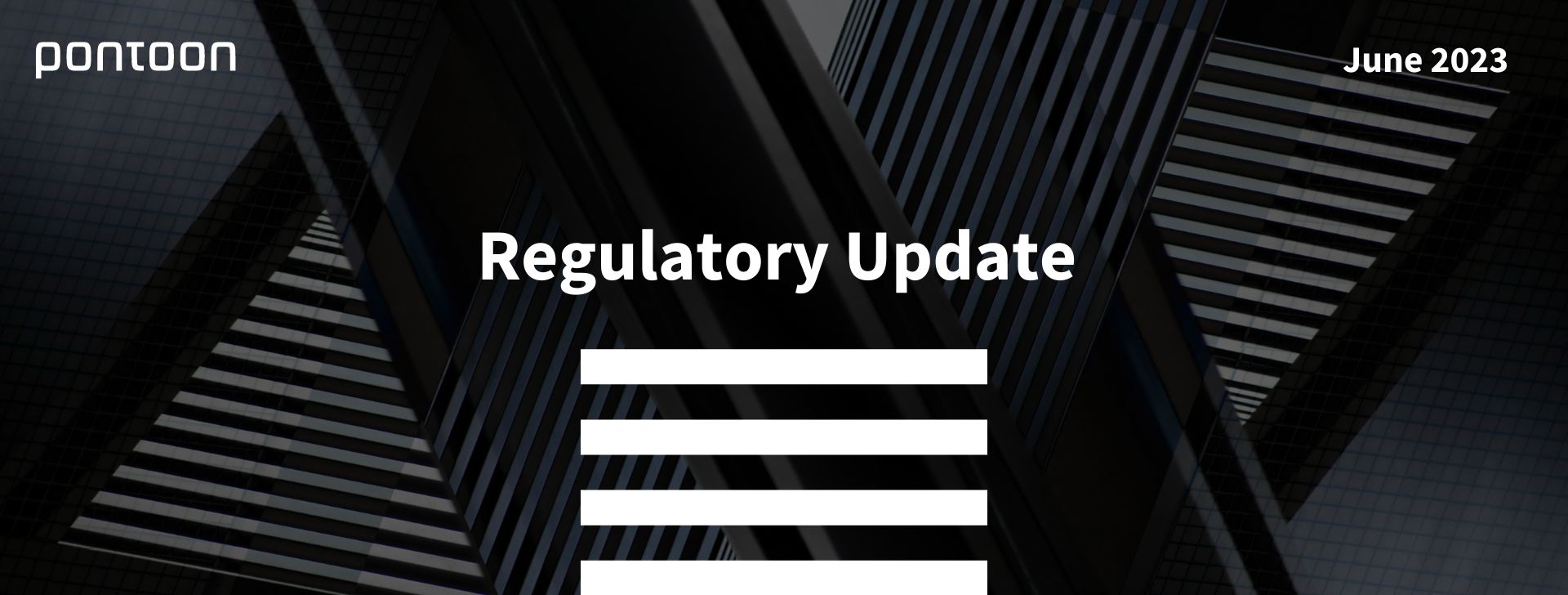Regulatory Update: June 2023
In our June 2023 Regulatory Update, we explore the latest regulatory news and insights affecting the world of work.
Our newsletter provides a concise summary of global employment updates that could impact your organisation, including new legislation, policy changes, market trends, and Pontoon’s key takeaways for employers.
Global efforts to regulate AI gain momentum
New rules in the EU and local initiatives in the US pave the way for responsible deployment
The global effort to regulate AI is just beginning, and many experts are calling for further control mechanisms. In the EU, new rules on AI have been approved that require mandatory consultation of workforce representation. Meanwhile, various initiatives at the local level in the US are gaining momentum, such as New York City’s AI law, which will come into effect in July this year.
This law mandates that employers inform candidates about AI-enhanced tools they use for hiring and promotion decisions, give candidates the option to request and learn what personal data is collected, and hire independent auditors to review their AI tools for potential bias on an annual basis. These efforts are important steps towards ensuring responsible and transparent deployment of AI.
Just like the pay transparency bill that New York implemented in 2022, this law is anticipated to inspire other US states to take action.
Key Considerations
With new AI legislation taking effect, it’s essential that organisations prepare accordingly to avoid any potential fines. Companies must educate themselves on how to best incorporate AI into attracting new talent and comply with legislation that requires the ethical use of recruitment technology.
At Pontoon, we leverage generative AI throughout the recruitment process to enhance the candidate experience. To ensure the safe and compliant use of these tools, we have issued a rigorous compliance policy that applies to all colleagues worldwide. The potential impact of generative AI on talent acquisition remains unknown. By staying ahead of the curve and deploying AI technology ethically, employers can ensure they are prepared for the changing landscape of recruitment.
As talent acquisition professionals, it is imperative to find a harmonious balance between using the advantages of AI while also preserving the crucial human aspect that is necessary for success in this industry.
Global policy updates
Evolution of pay transparency regulations
The European Union has agreed on a Pay Transparency Directive to ensure private and public employers are transparent with their pay structures, promote equal pay principles between genders, and provide employees with rights to information on their own pay levels. US states such as California, Colorado, and New York now require salary ranges in job postings, and several other countries are also implementing pay transparency rulings. The move towards more overall working condition transparency aligns with UN Sustainable Development goals.
Key Considerations
Pay transparency is shifting from solely addressing the gender pay gap to improving overall labour market transparency, empowering workers to seek better-paying jobs. As an employer, it’s important to include pay ranges within your job postings to attract top talent.
Also, partnering with an MSP is advised to guarantee that contingent labour suppliers can easily access their payment information and that it is accurately recorded in a system of record. Employers should prepare for increasing pay and working condition transparency, as it aligns with UN Sustainable Development goals such as gender equality and reduced inequalities.
US public affairs
Definition of an “Independent Contractor”
The U.S. Department of Labour proposed a rule regarding the classification of workers as employees or independent contractors back in October 2020. The final rule was expected to be released this May, but due to its partisan nature, was postponed. Administrations typically avoid releasing controversial rules while senior individuals await Senate confirmation. More
Key Considerations
Developments in the independent contractor legal realm should be carefully monitored. The use of independent contractors has always been a hotbed for litigation and changes in rules could impact how companies utilise ICs in the future. US employers should consider several key factors when classifying workers including but not limited to:
- Level of control the employer has over the worker’s job duties and work schedule
- Whether the worker can work for multiple clients
Employment news
“Restoring Overtime Pay Act of 2023” US rule to increase overtime salary threshold
Presented in Congress on March 29, 2023, this act aims to raise the salary threshold for white-collar exemptions and proposes yearly updates until 2026. If the act is passed, millions of workers will no longer meet the salary threshold and will be entitled to overtime pay, irrespective of being paid on a salary basis and fulfilling the job duties requirements.
Currently, around 30% of full-time workers earn less than the current threshold of $35,568, regardless of whether they are paid on a salary or hourly basis. More
Key Considerations
Employers should proceed with caution and continue planning for the eventual implementation of the new rules.
Those who have already implemented changes must now weigh the financial benefits of retaining those changes against the potential legal outcomes. This requires careful consideration as they navigate the uncertain legal landscape ahead.
Employers should review their worker’s salaries and reclassify roles as necessary to ensure compliance with the new rule. In addition, employers may need to consider adjusting workloads or schedules to avoid costly overtime payments.
The EU Year of Skills in 2023
On May 9th, the European Year of Skills was officially kicked off, helping companies address skills shortages in the EU.
As technology takes over the job market, it’s crucial to upskill and reskill to bridge the existing skills gap in Europe. Shockingly, 77% of EU companies have trouble recruiting qualified employees while only 54% of the workers in the region have basic digital skills.
The European Commission shares these alarming numbers and highlights the importance of upgrading employee skillsets to stay competitive in the job market.
Key Considerations
As part of our speciality advisory service, Pontoon Instinct, we offer these recommendations for employers to reimagine their reskilling and upskilling programmes:
- Early Career Engagement – understand systemic changes to talent availability through public, private and academic partnerships.
- Career Mobility Programmes – focus on internal and external, custom-designed academy programmes to up- and reskill your existing workforce.
Country announcements
United Kingdom
In its 2023 budget, the government has introduced incentives for senior labour participation, most notably the introduction of “returnships”. More
Germany
The country is revisiting its benefits system, the “Citizen Income”. Key in the reform is less reciprocity and more focus on training. The government is moving forward with its plan to introduce one year paid training leave. More
France
Executive action pushed a retirement age rise through Parliament. Key dimensions include tax breaks for hiring and training seniors. More
Brazil
The new government has increased the minimum wage and started stakeholder consultations on regulations for platform work. More
United States
The issue of equal pay in staffing is gaining traction at the state level. New Jersey recently implemented new regulations with more states to follow. More
Temporary workers bill of rights law – New Jersey
On February 6, 2023, New Jersey’s Governor signed the Temporary Workers’ Bill of Rights into law. This bill grants temporary blue-collar workers in specific job categories significant employment rights with staffing agencies.
The new law carries major employer implications and places mandatory pay and notification requirements on both staffing agencies and their clients.
Employees in New Jersey will be provided with the official Temporary Labourer Assignment Notification Form during initial onboarding and prior to subsequent assignments for qualifying occupations.
Key Considerations
Employers in New Jersey must take several key actions to comply with the new temporary workers’ Bill of Rights law, which comes into effect on August 5, 2023.
These actions include ensuring pay parity for temporary workers, implementing new record-keeping requirements, updating associate pay stub requirements, and preparing for penalties for non-compliance.
The law states that staffing companies and their clients must ensure that temporary workers receive the same pay and benefits as regular employees in similar positions, and keep accurate records of hours worked and wages paid. Employers must provide detailed information on associate pay stubs such as rate of pay, hours worked, and deductions. Non-compliance can result in significant penalties, including fines and potential legal action.
Disclaimer:
The information provided herein does not, and is not intended to, constitute legal advice; all information, content, and materials available in this newsletter are for general informational purposes only. Information herein may not constitute the most up-to-date legal or other information. You should contact your attorney to obtain advice concerning any legal matter, including but not limited to the general information contained herein.
Related Post
Exciting advancements in generative AI are creating a buzz across all industries, and it's no surprise that talent acquisition companies are keeping a close eye on these developments. Surveys reveal ...





